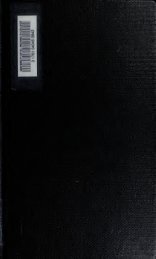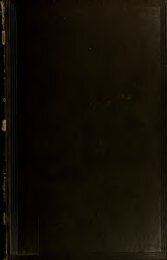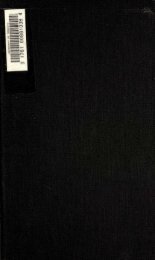Texts from the Buddhist canon : commonly known as Dhammapada
Texts from the Buddhist canon : commonly known as Dhammapada
Texts from the Buddhist canon : commonly known as Dhammapada
Create successful ePaper yourself
Turn your PDF publications into a flip-book with our unique Google optimized e-Paper software.
IMPERMANENCY. 37<br />
to become a Bhiksliunt, whicli being readily granted, she<br />
<strong>as</strong>sumed <strong>the</strong> robes and <strong>the</strong> tonsure, and soon became a<br />
Eahat, and all <strong>the</strong> rest who heard <strong>the</strong> words of Buddha<br />
were filled with inexpressible joy.<br />
6. In days of old when Buddha w<strong>as</strong> dwelling in <strong>the</strong><br />
Bamboo Garden near Eajagriha, preaching <strong>the</strong> Law,<br />
<strong>the</strong>re w<strong>as</strong> a certain Brahmach§,rin and his three bro<strong>the</strong>rs,<br />
who had obtained spiritual perception, and <strong>the</strong>reby knew<br />
that after seven days <strong>the</strong>y would have to die. On which<br />
<strong>the</strong>y said— "By our spiritual power we can overturn<br />
heaven and earth, touch <strong>the</strong> sun and moon, move mountains,<br />
and check <strong>the</strong> flowing torrent, but yet after all we<br />
cannot arrest death." Then one said, " I will seek out in<br />
<strong>the</strong> depths of ocean this Demon of inconstancy and<br />
destroy him." Ano<strong>the</strong>r said, " I will rend Mount Sumeru<br />
in twain, and enter <strong>the</strong>re to seek this Demon of inconstancy<br />
to destroy him." Ano<strong>the</strong>r said, "I^will mount<br />
into remotest space to seek <strong>the</strong> Demon of inconstancy and<br />
destroy him." Ano<strong>the</strong>r said, " I will enter <strong>the</strong> bowels of<br />
<strong>the</strong> earth to seek him and destroy him." The King of <strong>the</strong><br />
country having heard of <strong>the</strong>se men, came tp Buddha to<br />
inquire respecting <strong>the</strong> point, on which <strong>the</strong> Honoured of <strong>the</strong><br />
world explained that <strong>the</strong>re were four things which, whilst<br />
we are in <strong>the</strong> world (jjin), cannot be escaped, ist. It is<br />
impossible to avoid birth in some form or o<strong>the</strong>r; 2d,<br />
Having been born it is impossible to escape old age<br />
3d, When old, it is inlpossible to escape infirmity and<br />
dise<strong>as</strong>e ; 4th, Under <strong>the</strong>se circumstances, it is impossible<br />
to escape death—and <strong>the</strong>n he added <strong>the</strong>se verses and<br />
said<br />
—<br />
'* Nei<strong>the</strong>r in space, nor in <strong>the</strong> depths of ocean,^<br />
1 This verse agrees with v. 128 of Dhanunapada are; take, e.g., <strong>the</strong><br />
<strong>the</strong> Sou<strong>the</strong>rn version. It occnrs in pada preceding <strong>the</strong> one just named<br />
Cod. iii. K. II. fol. f. I wouM here in Cod. iii. " Doing evil, you wUl go<br />
notice (by <strong>the</strong> way) how singularly to Hell. Doing good (or "preparcurt<br />
and definite <strong>the</strong>se verses of ing," or "practising" good), you will<br />
;





